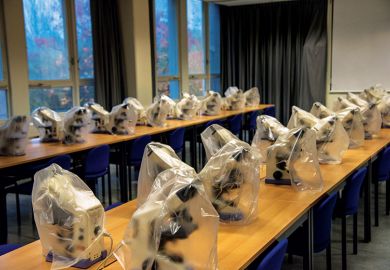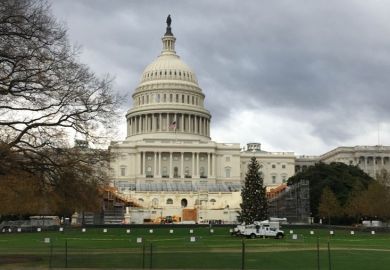While plans for a huge hike in US research spending face a tough hearing in Congress, Joe Biden’s $2.3 trillion (£1.3 trillion) infrastructure investment plan promises a surge in demand for higher education, experts said.
The 10-year programme aims to reshape America’s economy by spending big on transport projects, advanced manufacturing and clean energy, and is likely to make significant demands on universities to meet massive training needs.
At a White House briefing, Mr Biden promised US campuses that they were “going to see more change in the next 10 years than we’ve seen in the last 50 years”.
And the Business-Higher Education Forum, a grouping of top corporate and university presidents, predicted that even a robust estimate of the plan’s implications for boosting post-secondary enrolment might be selling the idea short.
An initial analysis by Georgetown University’s Center on Education and the Workforce projected that the Biden infrastructure bill would create 7 million new jobs requiring at least some level of college-level training.
But the real effect could prove far more robust when counting the long-term multiplier effects on job demand of the technological gains likely from the Biden plan, said Brian Fitzgerald, chief executive of the Business-Higher Education Forum.
The Georgetown assessment anticipates the Biden bill creating 15 million jobs, with 8 million requiring no qualification above a high school diploma. Almost 5 million other jobs will require more than a high school diploma but less than a bachelor’s degree, and more than 2 million other positions will demand a bachelor’s degree or higher, it said.
“These are first-order estimates,” Dr Fitzgerald said of the Georgetown figures, “and we think there are significant second-order effects that will be accelerated by these infrastructure investments.”
The Biden bill could fuel enrolment gains by campuses at all levels – from community colleges to private liberal arts institutions – that partner with businesses to expand non-degree credentials and apprentice-style relationships, Dr Fitzgerald said.
And that transformation would be in not just scientific and technical fields but across a variety of majors including communications and critical thinking, he said.
Examples of the need include the arrival of 5G internet technologies, which demand “very sophisticated” knowledge even among those stringing the wires to telephone poles, Dr Fitzgerald said.
“Those installers are going to have to have a very, very different set of skills than, as the utilities used to say, the installers of sticks and wires,” he said. “This is an opportunity to break down the silos between education and training.”
Along with job training implications, US colleges and universities would benefit from $250 billion in federal research spending in the 10-year Biden plan. That amount includes $5 billion a year for the National Science Foundation, representing a nearly 60 per cent increase in its annual budget.
The optimism within US higher education over such numbers is tempered by the fact that Mr Biden’s party holds only a narrow majority in both houses of Congress. No Republicans support the plan, and some Democrats already are baulking over major elements including the plan’s provisions for higher corporate taxes.
“At best for Biden, the bill will undergo an intermediate operation before passage,” said Larry Sabato, a professor of politics at the University of Virginia. “What will be kept, what will be dropped, what the price tag will be? Let’s try to find Nostradamus.”
Register to continue
Why register?
- Registration is free and only takes a moment
- Once registered, you can read 3 articles a month
- Sign up for our newsletter
Subscribe
Or subscribe for unlimited access to:
- Unlimited access to news, views, insights & reviews
- Digital editions
- Digital access to THE’s university and college rankings analysis
Already registered or a current subscriber?








